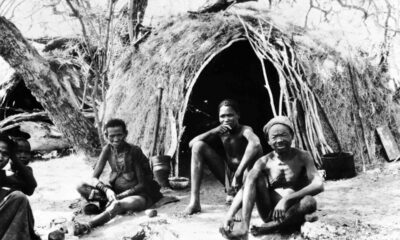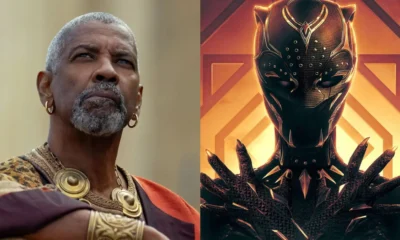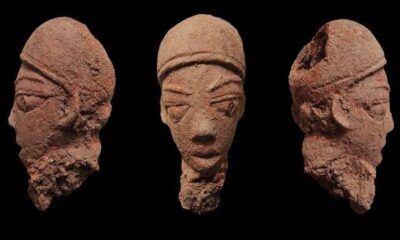ARTS & CULTURE
Banyankole Tribe: Where Bride’s Aunt Sleeps With Groom To Test His Skills
Published
2 years agoon
By
wpadminee
The Banyankole are a large tribe located in the western districts of South Sudan. They are known for their traditions and culture, one of which is the desire for a perfect marriage. This desire is taken to the extreme, with some families going to great lengths as to let the bride’s aunt sleep with the groom just to test-run his bedroom skills.
This tribe, also known as the Ankole people, esteem the significance of virginity. In their culture, a young woman is expected to remain sexually pure. In return, a potential groom must also have exceptional prowess in the bedroom to ensure full satisfaction of the bride. Such responsibility to determine the sexual prowess of the groom falls on the bride’s knowledgeable aunt.
This duty is entrusted to the aunt from an early age, typically when a young girl reaches the tender age of eight. With great care and diligence, the aunt begins the grooming process, preparing the young girl for her future marriage.
It is believed that once the girl develops her womanly curves, she is to remain chaste until the significant occasion of her wedding night. Failure to adhere to this strict decree can result in severe social exclusion, and in some cases, the ultimate penalty – death.
Beauty too, holds an important role within this tribe. The Banyankole tribe perceived being soft, curved, and sexually attractive as a sign of allure, causing young girls to be hidden indoors. There, they are pampered with sumptuous feasts comprising beef, millet porridge, and large amounts of milk. This is done with the intent of enriching their fatness to match the tribe’s ideas of attractiveness.
The aunt’s responsibilities extend far beyond just guardianship. The aunt is also obligated with the duty of both finding out the groom’s sexual prowess and educating the bride-to-be on her future husband’s sexual capabilities. The aunt skillfully measures the groom’s sexual prowess by having sex with him, ensuring the groom possesses the necessary skills to satisfy his wife’s desires.
This act comes before the groom is allowed to wed his wife. The groom pays the bride’s family, and then there are celebrations and a feast. After the feast, the couple then consummate their marriage with the bride’s aunt present as a witness to help the couple improve their sex life.
This tradition shows the importance of virtue and family values in the Banyankole tribe. The Banyankole people have a rich history that combines love, desire, and tradition. It is a fascinating journey for the aunt, bride, and groom in this Ugandan tribe.
While this ancient tradition may perplex and amaze those unfamiliar with its customs, it reveals the importance accorded to virtue within the Banyankole tribe. The depths of their commitment to upholding and cherishing the purity of their womenfolk underscore the significance they place on the union of two souls.
With the uniqueness of this tribe, you would ask:
Where is Banyankole tribe?
The Banyankole tribe are the second largest ethnic group in Uganda, after the Baganda, the strongest tribe. The tribe are predominantly found in the western part of Uganda, in the districts of Mbarara, Bushenyi, and Ntungamo.
What is the origin of Banyankole tribe?
The tribe originated from the combination of two main ethnic groups: the Bairu and the Bahima, with Bairu as the majority group who are Bantu agriculturists, and Bahima as the minority group who are Nilotic pastoralists. The Bairu is believed to have arrived in Ankole long before the Bahima.
The Bairu and the Bahima have a long history of interaction and conflict. The Bahima were traditionally the dominant group, and they ruled the Bairu as serfs. However, the Bairu have become increasingly assertive in recent years, and they are now playing a more equal role in Ankole society.
Despite their differences, the Bairu and the Bahima are united by their common identity as Banyankole. They share a common language, Runyankole, and they have a common history and culture. The Bairu and the Bahima are working together to build a better future for their people.
What are Banyankole known for?
The Banyankole people were known for their long-horned cattle. This breed is a type of humped cattle found in Africa. They are known for their long, curved horns, which can grow up to 6 feet long. The Mugabe, or king, was an absolute ruler and claimed all the cattle in the kingdom as a way to assert his power and authority.
The Banyankole cattle are an important part of their economy. They were used for milk, meat, and hides. They were also used as a form of currency and as a way to display wealth and status.
What is the religion of the Banyankole tribe?
Christianity is the dominant religion among the Banyankole tribe, with over 80% of the population identifying as Christian. The Roman Catholic Church and the Church of Uganda are the two largest Christian denominations among the Banyankole.
Prior to the arrival of Christianity, the Banyankole were animists, who believed in a variety of spirits and gods. They also practised traditional rituals and ceremonies. However, Christianity began to spread among the Banyankole in the 19th century, and it has since become the dominant religion.
Regardless of the Christianity that came to them, there are still some elements of the traditional Banyankole religion that persist, even among Christians. For example, many Banyankole still believe in the power of traditional healers and diviners.
Despite all, Christianity has had a positive impact on Banyankole culture. It has helped to promote education, development, and social harmony.
Who is the god of Banyankole?
Ruhanga is the supreme god in the traditional Banyankole religion. He is believed to be the creator of the world and all living things. Ruhanga is also believed to be a benevolent god who watches over his people and protects them from harm.
The Banyankole believed that Ruhanga could be communicated with through prayer and sacrifice. They also believed that Ruhanga could punish those who disobeyed him.
The Christian missionary movement in the 19th century had a significant impact on the Banyankole religion. Many Banyankole converted to Christianity, and the traditional religion began to decline. However, some traditional acts still remain.
If you like more posts on indigenous African arts and culture, check out our “Arts and Culture” page here.
You may like
ARTS & CULTURE
Ijele Masquerade: The “King Of Masquerades” In Igbo Land
Published
4 months agoon
December 21, 2024By
wpadminee
The Ijele Masquerade, often referred to as the “King of Masquerades,” holds a revered position in Igbo culture. It is not only the largest masquerade in Africa but also a symbol of unity, spirituality, and cultural identity among the Igbo people.
Its towering presence, vibrant artistry, and profound symbolism make it a centrepiece of Igbo traditions.
The Ijele Masquerade originated in southeastern Nigeria, particularly in Anambra and Enugu states. Oral traditions trace their roots to the Akwunechenyi dance group in Umueri.
It began as a celebratory and protective figure, initially created to intimidate invaders and celebrate royalty. Over time, it evolved into a cultural icon representing greatness and the Igbo people’s connection to their ancestors.
Standing between 12 and 15 feet tall, the Ijele Masquerade is a marvel of craftsmanship. It is constructed from bamboo, colourful fabrics, and intricate carvings.
Its structure is divided into two segments: the upper (Mkpu Ijele) and the lower part (Akpakwuru Ijele), separated by a symbolic python figure, Eke-Ogba.
This design signifies the balance between the spiritual and earthly realms. The preparation of the masquerade requires extensive collaboration, with over 100 men working for six months to complete its elaborate design.
Cultural and Spiritual Significance of Ijele Masquerade
The Ijele Masquerade embodies the collective spirit of the Igbo community. It is a representation of the ancestors’ guidance, protection, and blessings.
Traditionally performed during festivals, burials, and special ceremonies, the Ijele is believed to have spiritual powers, such as warding off evil spirits, promoting fertility, and bringing healing.
Its performance is both a spectacle of entertainment and a deeply spiritual ritual that connects the living to their heritage.
The Ijele Masquerade is a highlight of Igbo cultural festivals, often serving as the grand finale. Accompanied by music, drumming, and traditional dances, its performance captivates audiences with its grandeur and artistry.
These events also serve as a platform for preserving and promoting Igbo heritage, attracting tourists, and generating economic benefits for the community.
Challenges Facing Ijele Masquerade
Despite its cultural significance, the Ijele Masquerade faces challenges in the modern era. Urbanisation, globalisation, and declining interest among younger generations threaten its preservation.
The elaborate nature of its preparation also requires significant funding and resources, which are often scarce. Additionally, cultural appropriation by outsiders risks diluting its authenticity and significance.
Efforts to preserve the Ijele Masquerade have gained international recognition. In 2009, UNESCO listed it as an intangible cultural heritage in need of safeguarding.
This recognition highlights the importance of supporting local communities to maintain their traditions. Advocacy for funding, education, and tourism initiatives is vital to ensuring the continuity of this cultural treasure.
A Symbol of Igbo Identity
The Ijele Masquerade remains a powerful symbol of Igbo identity and resilience. It is a testament to the creativity, spirituality, and unity of the Igbo people.
As it continues to inspire pride and admiration, the Ijele Masquerade underscores the importance of preserving cultural heritage in a rapidly changing world.
By supporting initiatives that promote Ijele, individuals and organisations can help sustain this remarkable tradition for future generations.
Its legacy is not only a source of pride for the Igbo people but also a significant contribution to the global appreciation of cultural diversity.
For further details about the Ijele Masquerade, see sources like UNESCO’s Intangible Cultural Heritage listing and articles exploring its cultural significance.
Read more on culture here.
ARTS & CULTURE
Does Anklet Really Signify Promiscuity?
Published
4 months agoon
December 7, 2024By
wpadminee
What is an anklet?
An anklet is a versatile piece of jewellery that women typically wear around their ankles. Crafted from materials like chains, beads, or a mix of both, anklet meanings vary across cultures and styles.
Many fashionable women choose anklets to make a bold style statement, embracing their elegance and charm.
In Nigeria, people often call this accessory a “leg chain” or “ankle chain,” reflecting its cultural relevance. In pop culture, it’s popularly known as an “ankle bracelet.”
Anklets here focus more on fashion than symbolism, though interpretations can differ. With various styles and intricate designs available, anklets offer countless aesthetic options, allowing women to showcase their personal flair.
Ultimately, anklet meanings can be deeply personal, influenced by tradition, culture, or simply individual taste.
Cultural and Historical Significance
Throughout history, anklets have held different meanings across various cultures. While some view them as mere adornments, others have associated them with deeper, sometimes controversial, connotations.
In some societies, ancient and modern, anklets symbolise promiscuity.
Early Usage in Ancient Civilisations
Egypt is often credited as the birthplace of anklets, but India played a significant role in their widespread acceptance. In India, anklets were part of traditional attire, known as pattilu, payal, or nupu.
These terms also include Paujinupur and padapadma. Early Indian literature, such as the first-century epic Silappatikaram, mentions anklets, highlighting their cultural importance.
Rajasthani women were known for their elaborate anklet designs, reflecting regional traditions.
Among the Odisha people, gold anklets were once reserved for warriors, while brides included them as part of their wedding regalia.
Married women often wore anklets to signify their marital status, and dancers used those with dangling bells to enhance their performances.
Similarly, in ancient Egypt, anklets indicated social status. Wealthy women wore gold anklets, while silver or leather versions were common among slaves and the poor.
These accessories, known as menefret or kholkai, reflected one’s place in the social hierarchy. Interestingly, some accounts suggest that anklets were linked to temple worshippers and even prostitutes, though these claims remain largely unverified.
Modern Evolution and Symbolism
Over time, the meaning of anklets has evolved significantly. In the 1970s, during America’s “sexual revolution,” anklets became symbols of female empowerment and liberation.
This era emphasised women’s freedom to express themselves, including their sexuality. Consequently, anklets began to carry connotations of promiscuity, especially within the “hotwife” culture.
The “Hotwife” Phenomenon
A “hotwife” refers to a married woman who engages in consensual extramarital relationships with her husband’s approval. Various anklet symbols reflect this dynamic:
- Two male symbols and one female symbol: Indicate openness to relationships with men of any race.
- Queen of spades: Represents a preference for Black men.
- Heart symbol: Suggests a happy marriage that includes mutually beneficial intimate relationships outside the primary partnership.
- The key to happiness: Denotes a marriage where the husband’s extramarital activities are contingent on his wife’s consent.
Anklets in Contemporary Nigerian Fashion
Today, many Nigerian women wear anklets purely for their aesthetic appeal, often unaware of the historical or cultural associations. For them, anklets are fashion accessories, not symbols of promiscuity or class distinction.
Despite lingering societal judgments, especially within conservative African contexts, it’s essential to recognize that fashion choices are personal.
Women should not face harsh criticism for wearing anklets, as these judgments stem from outdated or culturally irrelevant perspectives.
In conclusion…
Anklets are versatile fashion pieces that have transcended their historical roots. While some cultural connotations persist, modern women wear anklets to express their style and individuality.
It is crucial to separate fashion from judgement and allow women the freedom to make their own choices about their bodies and accessories.
Let’s appreciate anklets for what they are today: beautiful, empowering symbols of self-expression.
Read more articles here.
AFRICAN
The Only 4 African Countries That Have Won Miss Universe Title
Published
4 months agoon
December 7, 2024By
wpadminee
While many African countries have sent representatives to the pageant, only a few have managed to clinch the coveted Miss Universe crown.
The Miss Universe pageant is one of the most prestigious beauty pageants worldwide. It has been a stage for countless beautiful women to showcase their elegance, intelligence, and talent.
1. South Africa
South Africa is the African country with the most Miss Universe wins. This stunning nation has produced four Miss Universe winners:
- Margaret Gardiner (1978)
- Demi-Leigh Nel-Peters (2017)
- Zozibini Tunzi (2019)
- Andrea Meza (2020)
These South African beauties have not only captivated the world with their beauty but have also used their platforms to advocate for important social causes.
2. Namibia
Namibia, a small country in Southern Africa, has also made its mark on the Miss Universe stage.
- Michelle McLean won the Miss Universe title in 1992.
This stunning Namibian beauty brought pride to her nation and continues to be an inspiration to many.
3. Angola
Angola, a country rich in culture and natural beauty, has also produced a Miss Universe winner.
- Leila Lopes was crowned Miss Universe in 2011.
Her win marked a significant moment for Angola and showcased the beauty and talent of African women.
4. Botswana
Botswana, a landlocked country in Southern Africa, may be small, but it has produced one of the most iconic Miss Universe winners.
- Ntsepa Motsepe won the Miss Universe title in 1999.
Her win was a surprise to many, but it solidified Botswana’s place in the pageant world.
These four African countries – South Africa, Namibia, Angola, and Botswana – have proven that African beauty is truly global.
They have inspired countless young women across the continent and beyond to dream big and pursue their passions.
As the Miss Universe pageant continues to evolve, we can only hope to see more African countries adding their names to this prestigious list.
Check here for more articles.
Latest


Samsung Galaxy S25 Series Sets The Standard Of AI Phones As A True AI Companion
Samsung Galaxy S25 series sets the standard of AI phones as a true AI companion …Pioneering the multimodal era with...


5 Things To Expect In Afrobeats In 2025
Afrobeats is poised to reach unprecedented heights in 2025 as Nigerian music continues its remarkable global ascent. The genre’s explosive...


Here Are The 7 Most Ancient Countries On Earth
The oldest countries in the world stand as remarkable testaments to human civilisation, each containing landscapes and monuments that narrate...


Why Self-Reflection Is More Important Than Resolutions
Millions of people embark on a yearly ritual: they sit down with a notebook and pen, eager to craft a...


Nollywood Director, Kemi Adetiba Teases King Of Boys 3
Nollywood director Kemi Adetiba has revealed that another instalment of King of Boys will be released on December 25, 2025....


John McEnroe Says He Can Be The Commissioner Tennis Needs Amid Doping Crisis
Recent doping controversies involving top players have not damaged tennis’s reputation, but John McEnroe believes that appointing a single commissioner...


“Everybody Loves Jenifa” Becomes Nollywood’s Highest-Grossing Film Of All Time
Nollywood filmmaker Funke Akindele has achieved a historic milestone with her latest film, “Everybody Loves Jenifa.” The film has officially...


FG To Premiere TV Series, “Hidden Riches” On Mining Sector On January 25
Nigeria’s Federal Government will launch an ambitious television drama series focused on the nation’s mining sector, premiering “Hidden Riches” on...


Qing Madi Delivers A Soulful Performance Of “Favourite Pyscho”
Rising Afro-RnB sensation Qing Madi launches into 2025 with a mesmerising performance on the prestigious COLOURS platform, showcasing her latest...


Taiwo Awoniyi’s First Goal Of The Season Seals Nottingham Forest’s Win Over Wolves
Taiwo Awoniyi made a triumphant return to Premier League action. He scored in stoppage time to help Nottingham Forest crush...
-Ad-
















